August 30, 2025

The article titled "8 Key Factors Influencing BCBA Certification Costs" delves into the financial dynamics that shape the cost of obtaining BCBA certification. The certification costs can vary significantly, influenced by factors such as:
This variation underscores the necessity of meticulous financial planning. Additionally, exploring financial aid options is crucial for effectively managing these costs. As the demand for BCBAs continues to rise, understanding these financial factors becomes imperative for prospective candidates.
Becoming a Board Certified Behavior Analyst (BCBA) represents not only a commitment to professional excellence but also a significant financial investment. With certification costs ranging from $15,000 to over $40,000, prospective candidates encounter a multifaceted landscape of expenses, including:
As the demand for BCBAs is projected to rise sharply, understanding the factors that influence these costs is crucial. How can aspiring behavior analysts navigate this complex terrain to ensure their investment leads to rewarding career opportunities?
The demand for Board Certified Behavior Analysts (BCBAs) is projected to surge by an astounding 25% by 2026. This significant increase underscores the critical need for effective job matching in the rapidly evolving field of Applied Behavior Analysis therapy. Hire ABA is a dedicated recruitment platform that connects BCBAs with top job opportunities, streamlining the hiring process through personalized resume assessments.
At Hire ABA, we ensure that qualified professionals can easily find roles that align with their expertise and career aspirations. Our team meticulously evaluates each applicant's experience and goals, utilizing advanced job fit scoring to identify opportunities that match their skills, preferences, and desired locations. This approach not only enhances visibility for applicants but also fosters valuable connections with employers seeking specialized skills in a competitive job market.
The increase in job postings for behavior analysts is remarkable—rising from 7,091 in 2017 to 16,109 in 2018. Hire ABA plays a pivotal role in helping candidates navigate this dynamic landscape. Moreover, the average salary for a BCBA is around $85,571 per year, which illustrates the significant advantages that can offset the BCBA certification cost.
By leveraging platforms like Hire ABA, behavior analysts can effectively showcase their qualifications and secure roles that not only advance their professional development but also contribute to the progress of ABA therapy. Are you ready to enhance your recruitment strategy? Let Hire ABA guide you in connecting with the right talent.
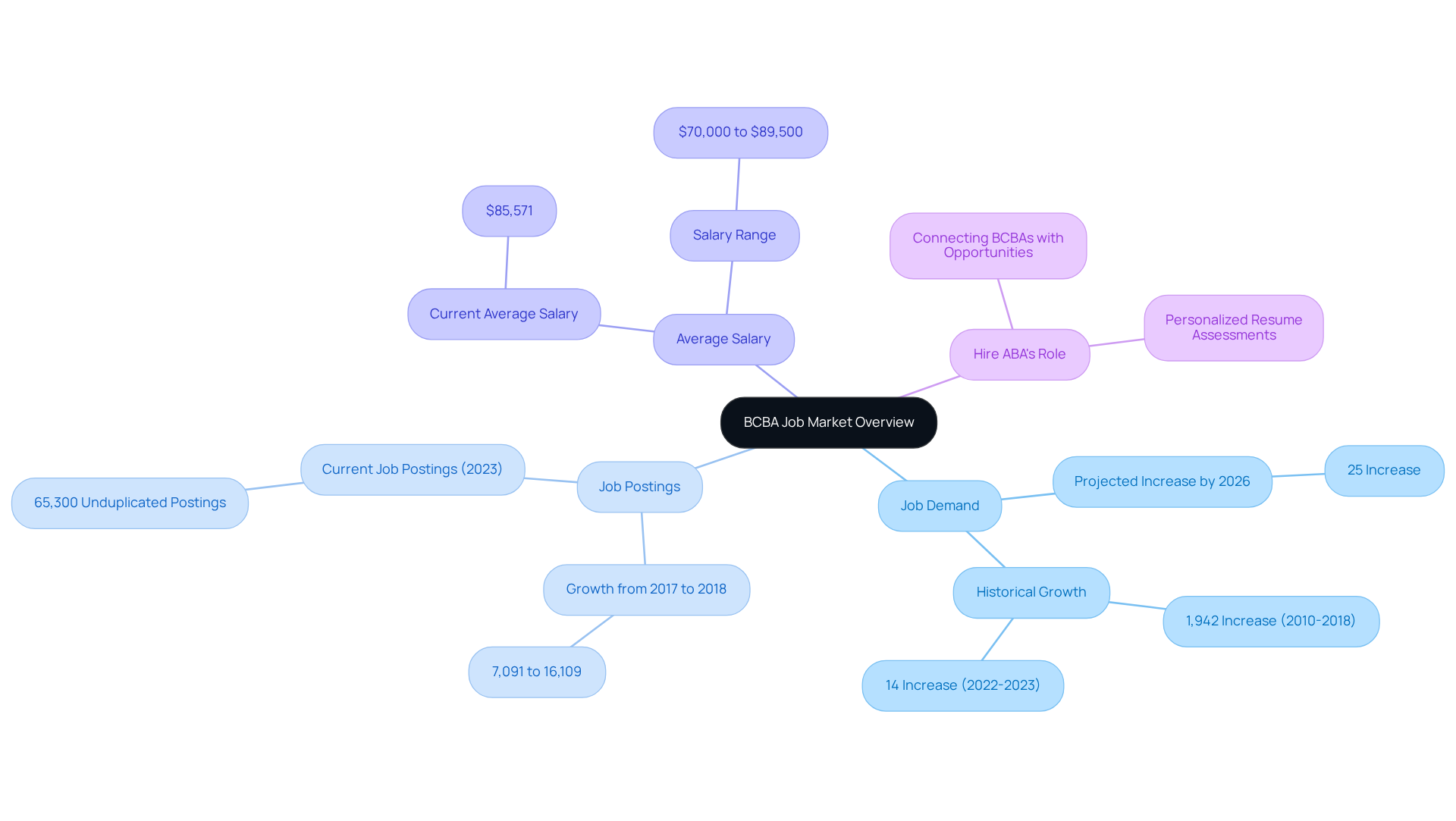
Pursuing a master's degree in Applied Behavior Analysis represents a substantial monetary commitment for aspiring Board Certified Behavior Analysts (BCBAs), especially when factoring in the BCBA certification cost. With BCBA certification cost typically ranging from $15,000 to over $40,000, influenced by factors such as the institution's reputation and program structure, this initial investment is vital for candidates to acquire the essential knowledge and skills needed for certification. Given the pressing concern of student debt, many graduates face significant economic strains. Therefore, it is crucial for prospective students to thoroughly investigate various programs. They should weigh the quality of education against the BCBA certification cost, ensuring informed decisions regarding their educational investments.
Moreover, exploring financial aid options can alleviate some of the monetary burden. Success stories abound, showcasing how candidates have effectively managed tuition expenses through scholarships and grants tailored for ABA master's programs. As Robert Kiyosaki aptly states, 'It’s not how much money you make, but how much you keep and how hard it works for you.' This underscores the importance of budgeting in the pursuit of educational goals. Furthermore, case studies such as 'The Risk of Not Taking Risks' can illustrate the significance of taking calculated risks in educational investments, offering practical examples for aspiring BCBAs.
To navigate the economic landscape effectively, candidates should actively seek out funding resources and success stories that demonstrate effective management of tuition expenses. Are you prepared to take the next step in your career? Explore your options and invest wisely in your future.
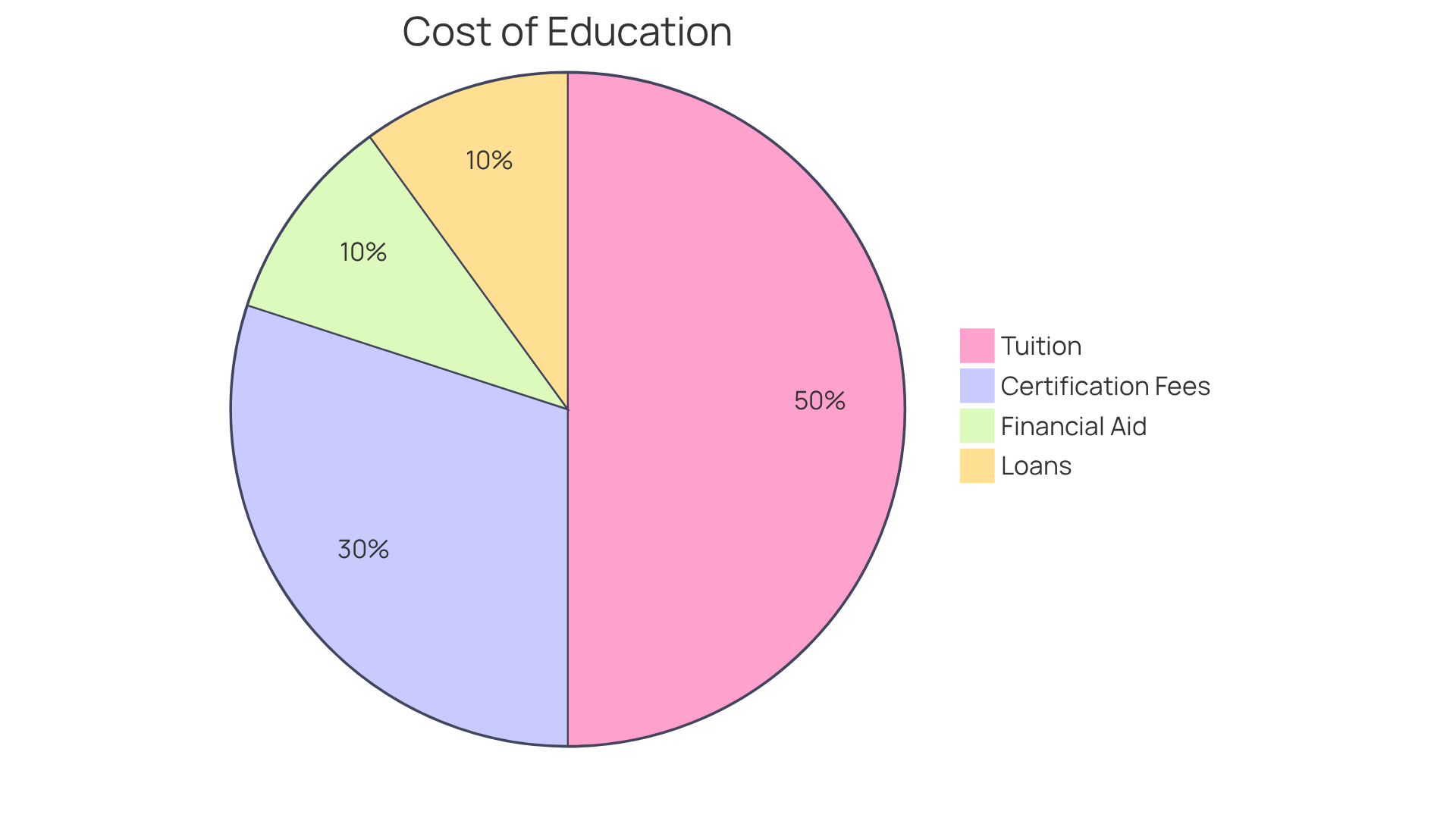
The bcba certification cost is a substantial financial investment required to become a Board Certified Behavior Analyst. The journey begins with examination fees, which include a non-refundable $245 application fee and a $125 examination fee. Candidates must also consider the costs associated with retaking the exam, which can escalate quickly. Each retake incurs a $140 application fee and a $125 examination fee, amounting to $265 for subsequent attempts. Notably, approximately 50% of first-time test-takers do not pass, underscoring the importance of understanding these financial obligations for effective budgeting.
In addition to examination costs, candidates should factor in expenses related to supervised fieldwork, which can range from $1,000 to $5,000 or more. Financial planning is crucial, as the BCBA certification cost can vary significantly, ranging from $11,500 to $35,000 or beyond, depending on individual circumstances. It is also essential to be aware of cancellation or rescheduling fees:
Moreover, study resources can cost between $100 and $500 or higher, further contributing to the overall financial commitment. Case studies reveal that individuals who create detailed budgets and explore financial aid options—such as scholarships or employer support—can significantly alleviate the financial burden associated with certification. This proactive approach not only prepares candidates for the expenses involved but also enhances their likelihood of successfully achieving their certification goals.
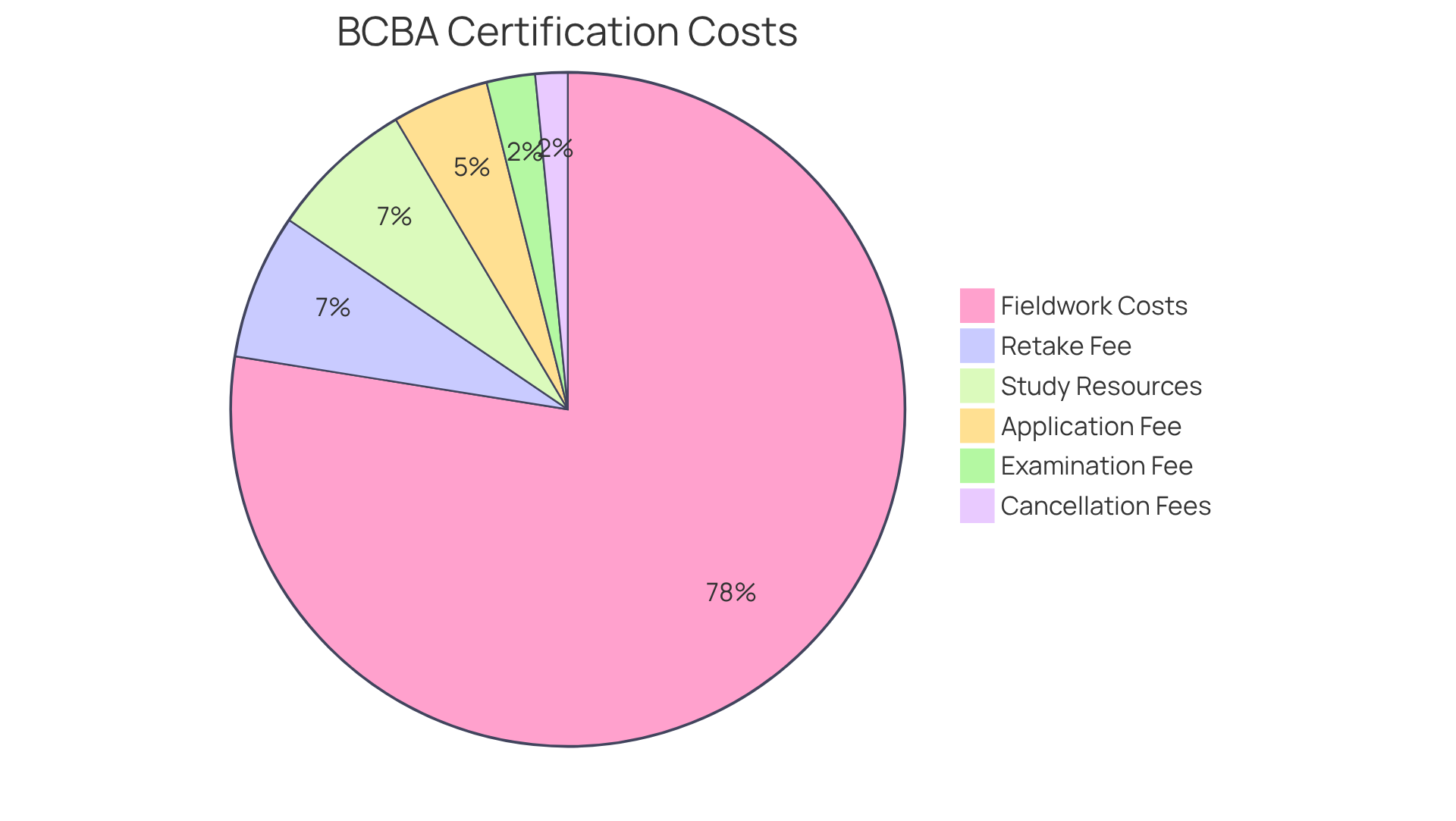
To maintain their certification, Board Certified Behavior Analysts (BCBAs) must complete a total of 32 continuing education units (CEUs) every two years. This requirement includes:
The BCBA certification cost associated with these CEUs typically ranges from $200 to $1,000, depending on the selected courses.
This investment in continuing education not only satisfies certification requirements but also significantly enhances professional skills and knowledge. Are you aware that participating in continuous education enables behavior analysts to remain competitive in the swiftly changing domain of Applied Behavior Analysis (ABA) therapy? Many employers prioritize candidates who actively pursue CEUs, reflecting a commitment to professional development.
Furthermore, behavior analysts who engage in continuous learning are better equipped to implement evidence-based practices, ultimately leading to improved therapeutic outcomes for clients. As one BCBA noted, 'Ongoing education is not just a requirement; it’s a pathway to excellence in our field.'
To effectively oversee the monetary aspects of continuing education, BCBAs can explore various options for earning CEUs, including:
These options provide flexibility in meeting their educational needs.
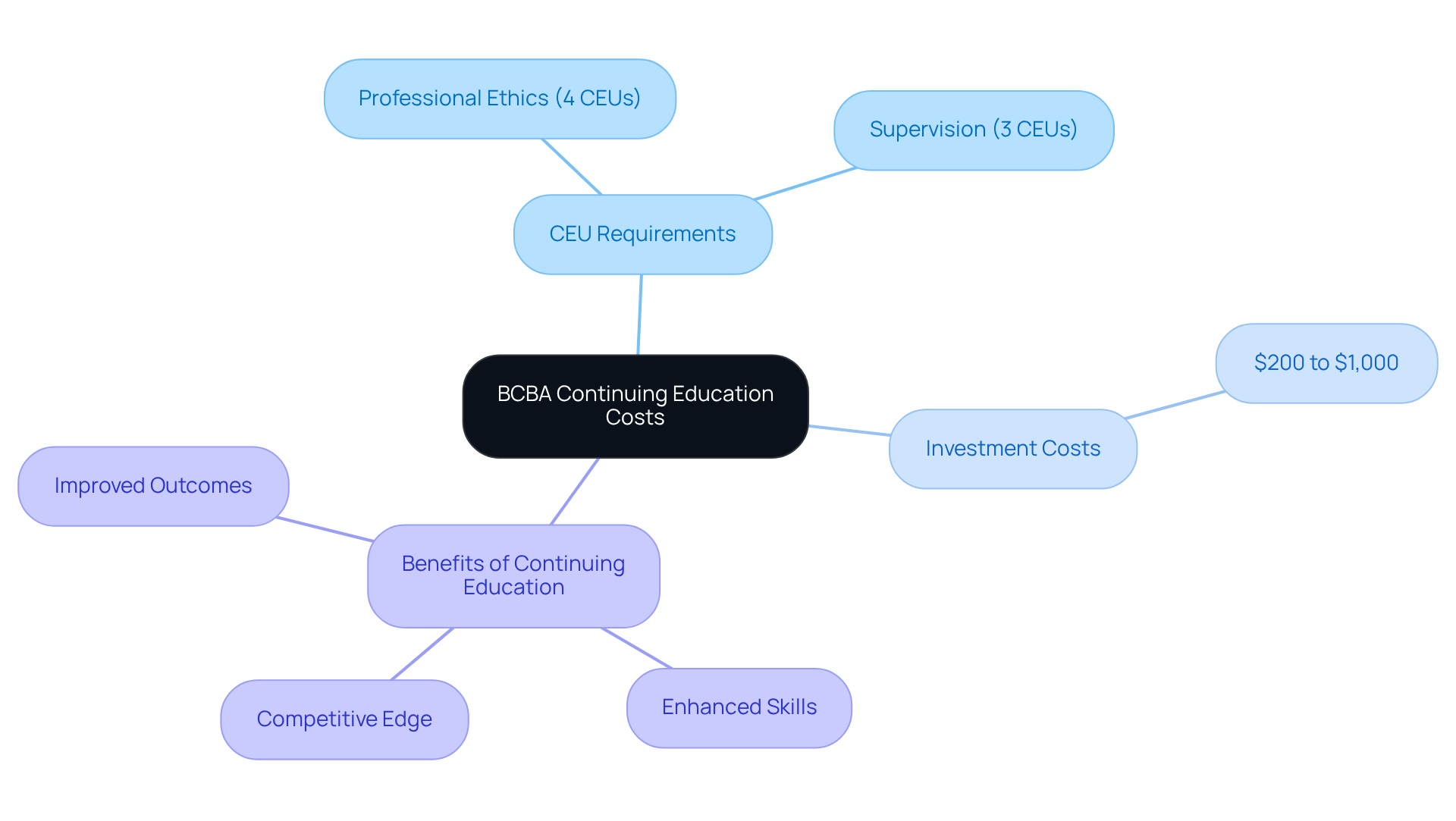
Preparing for the BCBA exam necessitates a significant financial investment, commonly referred to as the bcba certification cost, with individuals typically spending between $100 and $1,000 on study materials, courses, and practice exams. This investment is not merely a cost; it is a crucial step toward success. High-quality preparation tools substantially increase the likelihood of passing the exam on the first attempt, saving both time and money by minimizing the bcba certification cost associated with retaking the exam.
Successful candidates often attribute their achievements to effective study techniques and the use of comprehensive resources, such as:
These resources provide extensive practice questions and prompt feedback. As one successful BCBA aptly noted, 'Investing in the right study materials is investing in your future.' By prioritizing these essential resources, individuals can significantly enhance their preparation and ultimately achieve their certification goals more efficiently.

To meet the experience requirements for BCBA certification, individuals must complete a minimum of 2,000 hours of supervised fieldwork, with at least 500 hours dedicated to direct client work. Did you know that supervision fees typically range from $50 to $200 per hour, with an average rate of $80? This means that overall expenses for supervision can vary from $2,000 to more than $6,000. Therefore, it is crucial for applicants to budget efficiently.
Furthermore, at least 5% of fieldwork hours must be supervised each month, underscoring the importance of consistent oversight. Financial planning for these expenses is essential, as the investment in supervision not only fulfills certification requirements but also impacts the BCBA certification cost and enhances professional development.
Candidates are encouraged to explore various supervision options, including group rates and university programs, to find affordable solutions that align with their financial capabilities. Keeping thorough records of online supervision sessions is vital for tracking progress and meeting certification requirements. By creating a clear understanding of the BCBA certification cost upfront, candidates can navigate their path toward becoming a BCBA more efficiently.
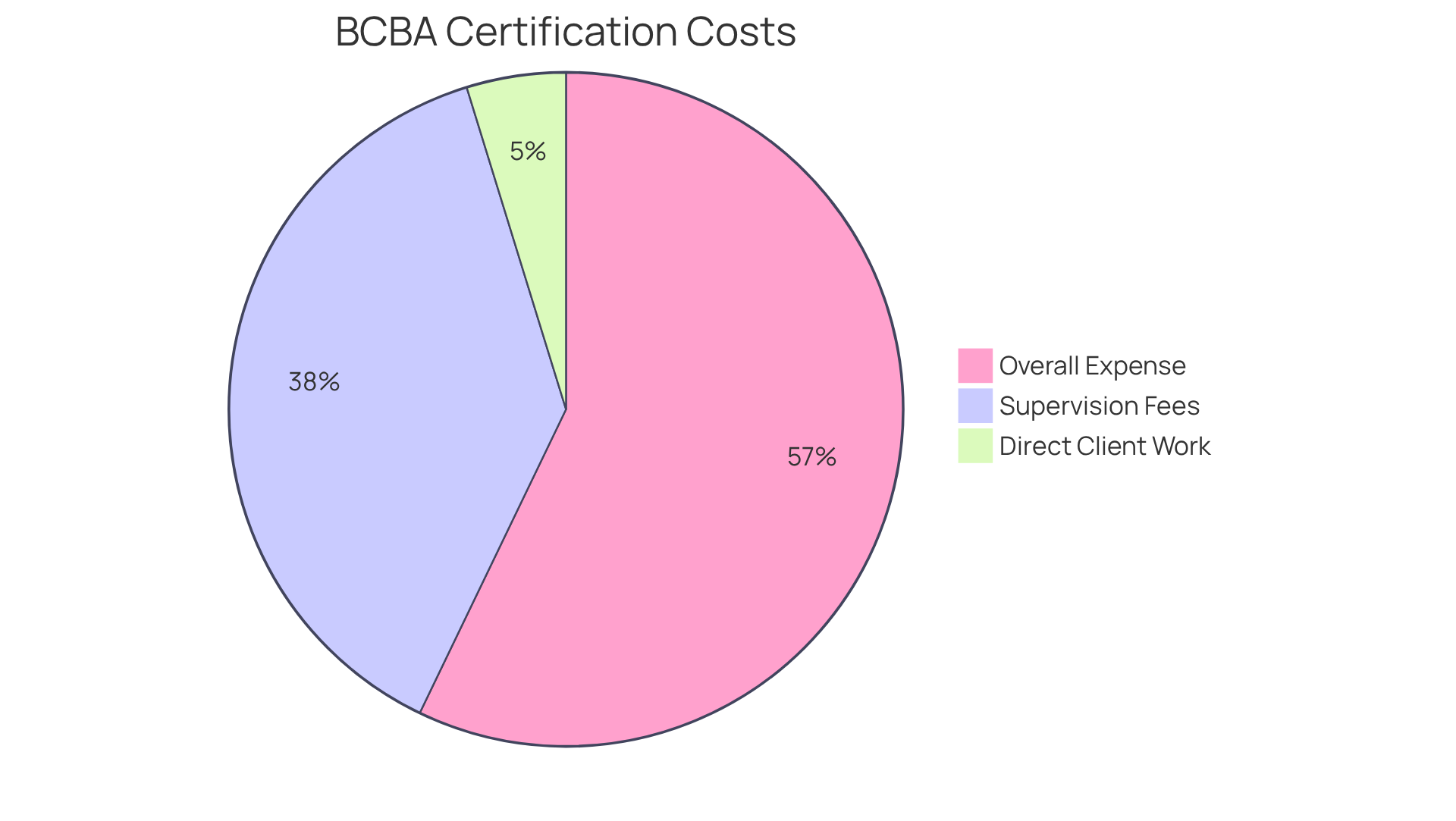
The expenses associated with the BCBA certification cost exhibit significant geographic variability. Tuition rates for master's programs and supervision fees are generally higher in urban areas compared to rural regions, reflecting the elevated cost of living and demand for educational resources. For instance, states such as New Jersey and Wisconsin, recognized for their robust job markets, frequently impose higher tuition rates, while regions like West Virginia and South Carolina may present more affordable options.
Moreover, the demand for board-certified behavior analysts directly influences salary expectations and job availability. In urban areas, where the need for skilled professionals is greater, Board Certified Behavior Analysts can command salaries averaging between $70,000 and $90,000. In contrast, rural regions may see earnings ranging from $50,000 to $65,000. This disparity highlights the importance for candidates to meticulously assess their location when planning their certification journey, as it can profoundly affect both the BCBA certification cost and their future earning potential.
Industry leaders assert that geographic considerations are essential for those aiming to become board-certified behavior analysts. As one expert remarked, "The increasing need for ABA services and the cost of living in different regions play a pivotal role in shaping salary expectations and job opportunities for BCBAs." Understanding these dynamics empowers individuals to make informed decisions regarding their education and career paths within the field of Applied Behavior Analysis.
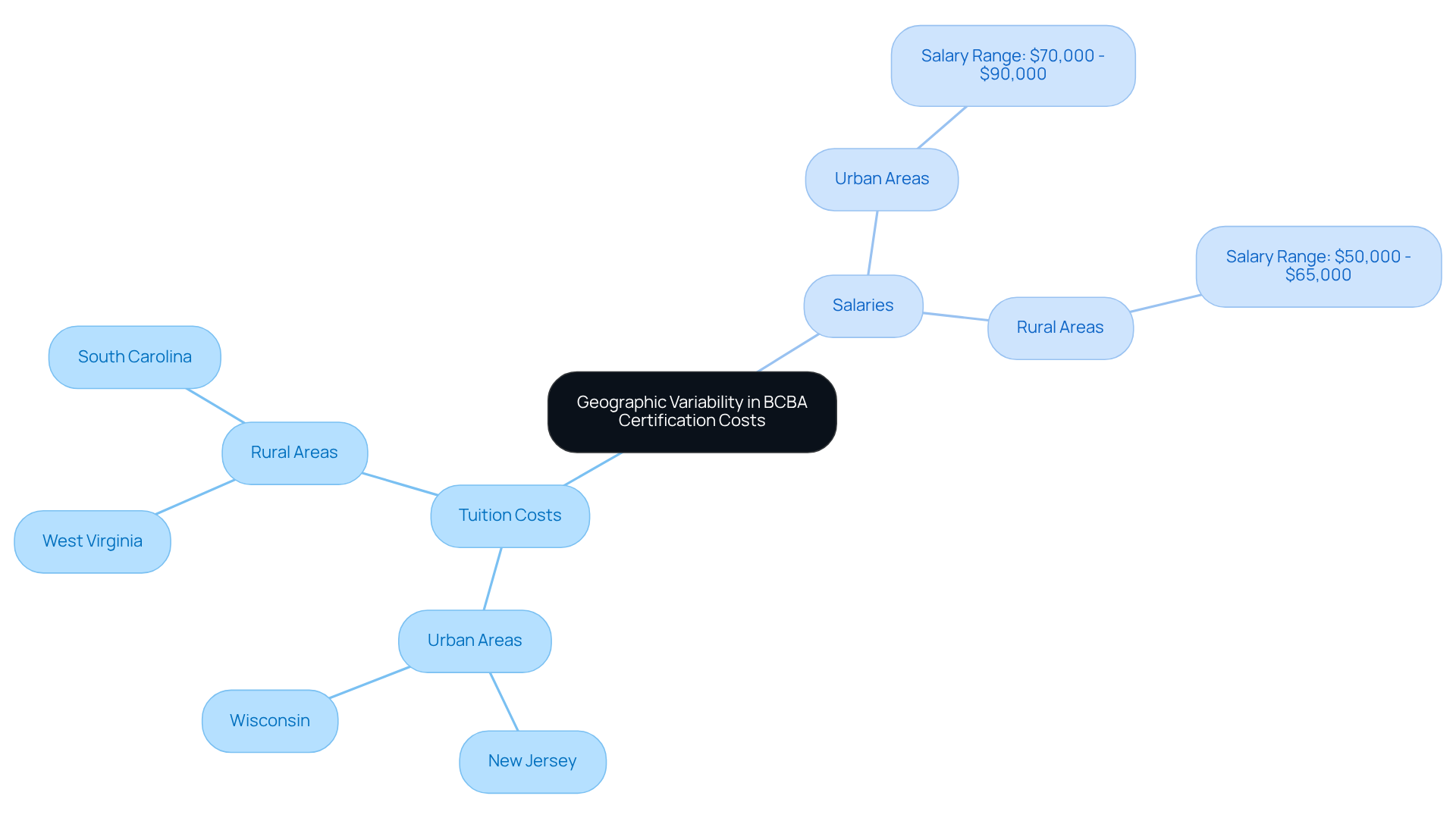
Enrolling in an accredited BCBA program is essential for obtaining a quality education that meets industry standards. Did you know that graduates from accredited programs experience significantly higher job placement rates? While tuition for these programs typically ranges from $20,000 to $50,000, the BCBA certification cost is often justified by the substantial advantages it provides. Graduates frequently secure positions shortly after completing their studies, enhancing their marketability in a competitive job market. Employers recognize the rigorous training and quality assurance associated with accredited credentials, making these graduates more appealing candidates.
The financial implications of attending an accredited program compared to the BCBA certification cost of a non-accredited program can be profound. Graduates from accredited programs often enjoy higher starting salaries and better long-term career growth, including opportunities for leadership roles and flexible working conditions. Education experts emphasize that accreditation not only validates the quality of the training received but also fosters a commitment to continuous improvement and ethical practice in the field of Applied Behavior Analysis.
Furthermore, ABAI-accredited programs benefit from increased marketing opportunities and waived fees at events like the ABAI Expo, further enhancing their appeal to prospective students. Are you ready to invest in a program that will not only elevate your career but also ensure you are equipped with the best practices in the field? Choosing an accredited BCBA program could be the key to unlocking your potential in Applied Behavior Analysis.
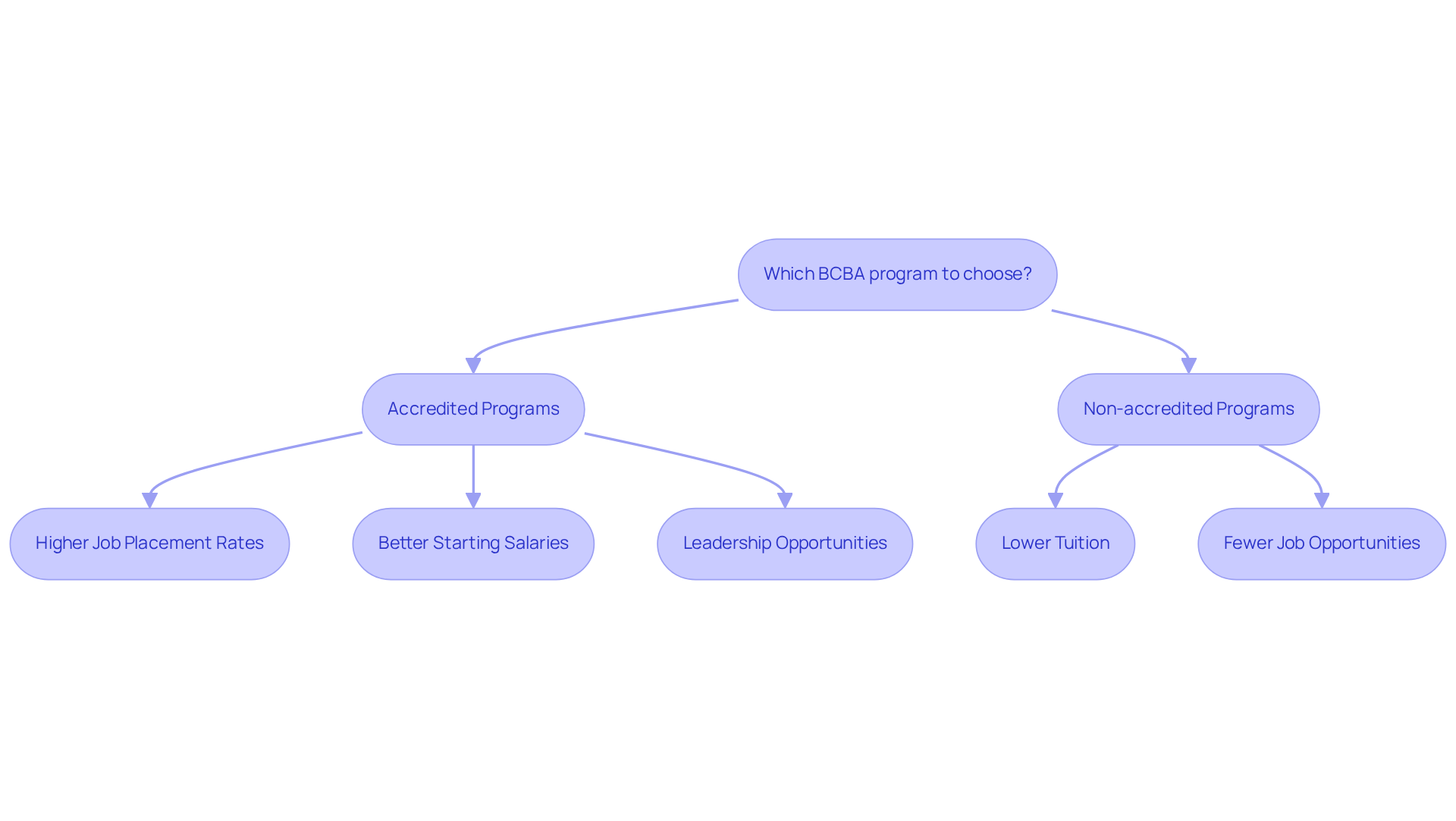
Individuals pursuing BCBA certification may find themselves eligible for various forms of assistance to help cover the BCBA certification cost, including:
For instance, programs like the Free Application for Federal Student Aid (FAFSA) play a crucial role in helping applicants secure funding to cover tuition and related expenses. Moreover, many employers provide tuition reimbursement programs, which can significantly alleviate the financial burden associated with the BCBA certification cost.
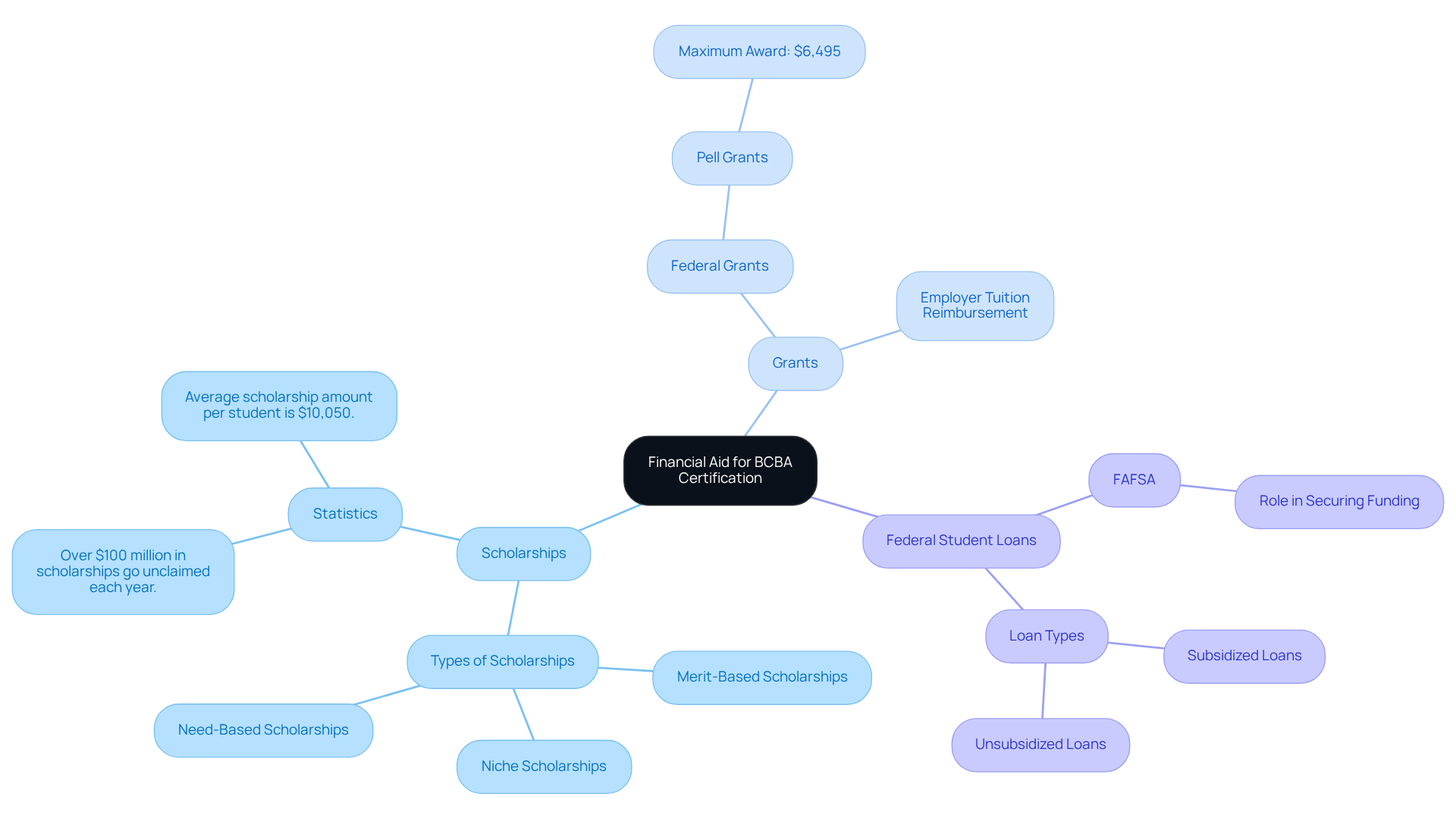
The demand for Board Certified Behavior Analysts (BCBAs) is projected to rise by 25% over the next five years. This surge presents a remarkable opportunity for professionals in the field. While the BCBA certification cost can be significant, the potential return on investment is substantial. Board Certified Behavior Analysts generally receive greater pay than non-certified professionals, with average earnings ranging from $51,000 to over $105,000 annually. In high-demand areas like Alaska and San Francisco, salaries can exceed $93,000, while in New York, the average salary is approximately $89,412.
As the demand for BCBAs continues to grow, so does job security and career advancement opportunities. Many BCBAs report that their certification has led to increased job satisfaction and opportunities for professional growth, particularly as new roles in leadership and remote positions emerge in this booming market.
Therefore, candidates should carefully evaluate the financial benefits of certification against the BCBA certification cost, including:
This evaluation is crucial for making informed decisions about their professional futures. Are you ready to take the next step in your career? Consider how BCBA certification can enhance your prospects and explore your options today.

The journey to becoming a Board Certified Behavior Analyst (BCBA) is marked by significant financial considerations that can profoundly influence the decisions of aspiring professionals. Understanding the various factors that shape BCBA certification costs—from tuition fees and examination expenses to ongoing education and supervision fees—provides a clearer picture of the financial commitment required. This insight empowers candidates to make informed choices about their educational investments and career trajectories.
Key insights underscore the necessity of evaluating the costs associated with accredited programs, recognizing the geographic variability in expenses, and assessing the potential return on investment. With the demand for BCBAs projected to rise significantly, the financial burden of certification can be mitigated by the lucrative salaries and job opportunities that await certified professionals. Exploring financial aid options and success stories can further alleviate the economic strain, rendering the pursuit of certification more accessible.
Ultimately, investing in BCBA certification not only enhances professional qualifications but also unlocks doors to rewarding career advancements. As the field of Applied Behavior Analysis continues to expand, prospective candidates are encouraged to weigh their options carefully and consider how this certification can lead to both personal fulfillment and financial stability. Taking proactive steps towards understanding and managing certification costs will ensure a successful and fulfilling career in behavior analysis.
What is Hire ABA and its purpose?
Hire ABA is a dedicated recruitment platform that connects Board Certified Behavior Analysts (BCBAs) with top job opportunities, streamlining the hiring process through personalized resume assessments.
Why is there a growing demand for BCBAs?
The demand for BCBAs is projected to surge by 25% by 2026, highlighting the critical need for effective job matching in the field of Applied Behavior Analysis therapy.
How does Hire ABA enhance the job matching process for BCBAs?
Hire ABA evaluates each applicant's experience and goals using advanced job fit scoring to identify opportunities that match their skills, preferences, and desired locations, enhancing visibility and fostering connections with employers.
What has been the trend in job postings for behavior analysts?
Job postings for behavior analysts increased significantly, rising from 7,091 in 2017 to 16,109 in 2018.
What is the average salary for a BCBA?
The average salary for a BCBA is around $85,571 per year.
What is the financial commitment involved in pursuing a master's degree for BCBA certification?
The cost of a master's degree in Applied Behavior Analysis typically ranges from $15,000 to over $40,000, depending on the institution's reputation and program structure.
What are some financial aid options available for aspiring BCBAs?
Aspiring BCBAs can explore scholarships and grants tailored for ABA master's programs to help manage tuition expenses.
What are the examination fees associated with BCBA certification?
The examination fees include a non-refundable $245 application fee and a $125 examination fee, with additional costs for retaking the exam.
What are the costs associated with retaking the BCBA examination?
Each retake incurs a $140 application fee and a $125 examination fee, totaling $265 for subsequent attempts.
What other expenses should candidates consider when pursuing BCBA certification?
Candidates should factor in expenses related to supervised fieldwork, which can range from $1,000 to $5,000 or more, as well as study resources that can cost between $100 and $500 or higher.
What are the cancellation or rescheduling fees for the BCBA exam?
The cancellation or rescheduling fees are $59 if changes are made 30 to 5 days before the exam and $65 if done 5 days or sooner.
Our expert recruitment strategies and AI-driven sourcing ensure that you receive top-notch candidates quickly, without compromising on quality. Whether you’re looking for BCBAs, Clinical Directors, or RBTs, we’ve got you covered.